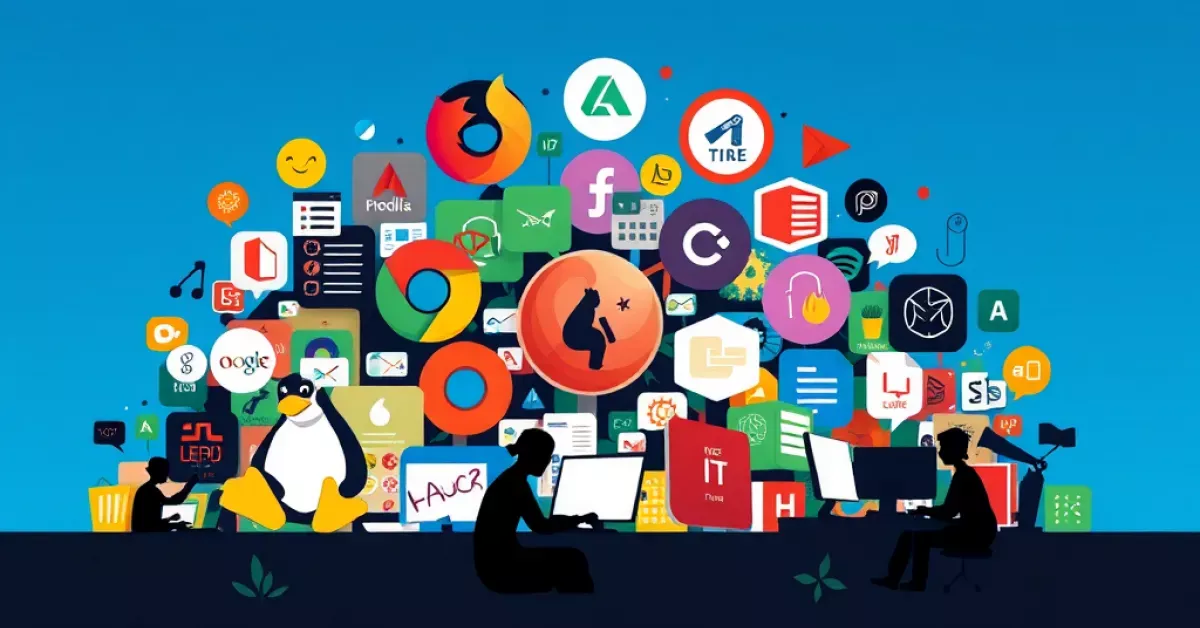Welcome to the fascinating world of open source software! If you’re just beginning to scratch the surface of this exciting realm, you’re in for a treat. Open source software has been revolutionising the way we use and interact with technology. It’s like a global community project where anyone can contribute, improve, and share software freely. Whether you’re a student, a tech enthusiast, or just curious about how these software tools work, this guide will help you navigate this world with ease and confidence.

Understanding Open Source Software: The Basics for Beginners
What is Open Source Software?
Open source software (OSS) is like a software playground where everyone gets a chance to join in. It’s software with its source code available for anyone to view, modify, and enhance. Unlike proprietary software, which keeps its code tightly guarded, OSS invites collaboration and sharing. Imagine a recipe you can freely access, tweak to your taste, and even share with friends—open source works much the same way.
Key Features of Open Source Software
Freedom and Flexibility are at the heart of open source. This software allows users to:
- Inspect and understand how the program works.
- Modify the code to suit specific needs.
- Share changes and improvements with others.
- Collaborate with a community of developers.
These features allow open source software to rapidly improve and adapt to changing needs.
Open Source vs Proprietary Software
The difference between open source and proprietary software is like choosing between cooking your meal and ordering takeout. With proprietary software, you’re limited to using what’s served. In contrast, open source software allows you to customise and tweak it, offering a more flexible and often free alternative.
The Benefits of Embracing Open Source Software
Cost-Effectiveness of Free Software
One of the most attractive aspects of open source software is its cost-effectiveness. Many OSS programs are available to download for free, eliminating expensive licence fees. This makes it especially appealing for students, small businesses, and anyone looking to save money while still accessing quality software.
Community-Driven Development and Collaboration
Open source thrives on community involvement, leading to an environment of constant improvement. With developers from around the world contributing their expertise, OSS projects can evolve quickly and incorporate features that cater to a broad user base. This community-driven development also means comprehensive support networks and abundant resources are available to users.
Exploring Popular Open Source Software and Tools
Linux: A Leading Open Source Operating System
Linux is one of the most well-known open source operating systems, powering millions of computers globally. It’s often favoured for its stability, security, and flexibility. With various distributions like Ubuntu and Fedora, Linux caters to beginners and advanced users alike, offering different features and user experiences.
Essential Tech Tools for Daily Use
Many everyday tools are open source, including:
- Mozilla Firefox: A secure and free web browser.
- VLC Media Player: Supports numerous audio and video formats without additional codecs.
- GIMP: A powerful alternative to Adobe Photoshop for image editing.
These tools demonstrate how open source makes high-quality software accessible to everyone.
Open Source Computer Programs for Productivity
For productivity, open source presents excellent options such as:
- LibreOffice: A complete office suite offering word processing, spreadsheets, and presentations.
- Thunderbird: An email client renowned for its security and customisation options.
- Notepad++: A lightweight text editor for coding and note-taking.
These tools rival their commercial counterparts, providing full functionality without the hefty price tag.
Getting Involved: How to Contribute to Open Source Projects

A laptop showcasing the Linux logo, epitomising the open source movement’s dedication to accessibility and innovation.
Getting Involved: How to Contribute to Open Source Projects
Code Contribution: Where to Start
For those interested in coding, open source projects offer a fantastic way to hone skills. Start by:
- Exploring projects you’re passionate about.
- Checking out their contribution guidelines.
- Tackling smaller tasks or bugs for an easy entry.
Navigating GitHub for Beginners
GitHub is a popular platform for hosting and sharing open source projects. Beginners can use GitHub to:
- Discover projects by searching repositories.
- Fork projects to make modifications.
- Submit pull requests to suggest changes.
The Role of Software Communities in Development
In open source, software communities play a crucial role. They provide support, share knowledge, and help resolve issues. Engaging with these communities can lead to valuable connections and insights.
Rewards of Collaboration and Innovation
Contributing to open source projects is rewarding as it:
- Enhances your technical skills.
- Builds your reputation in the tech community.
- Fosters innovation and creativity.
Understanding Open Source Licences and Their Impact
Common Types of Open Source Licences
Open source licences govern how software can be used and shared. Some common licences include:
- GNU General Public License (GPL): Requires sharing derivative works.
- MIT License: Offers more freedom with fewer restrictions.
- Apache License: Provides a balance, allowing modifications with proper attribution.
How Licences Affect Software Projects
Licences influence a project’s distribution and usage. They ensure the software remains free and open for further improvements, preserving the spirit of open source collaboration.
Importance of Software Freedom for Tech Enthusiasts
For tech enthusiasts, software freedom allows for exploring and experimenting with technology. It ensures that software can be adapted to meet specific needs, fostering a culture of innovation and openness.
Building Digital Skills Through Open Source Involvement

Exploring open source software and its transformative impact on technology.
Building Digital Skills Through Open Source Involvement
Enhancing Coding and Programming Skills
Working on open source projects provides hands-on experience that can significantly enhance coding and programming skills, offering practical application outside the classroom.
Opportunities for Learning and Growth
Open source participation offers endless opportunities for learning. Contributors can gain new skills, experience different roles within a project, and learn from seasoned developers.
Overcoming Challenges as a New Open Source Contributor
Troubleshooting and Problem-Solving
New contributors might face challenges, but overcoming these is part of the learning journey. Engaging with others and seeking feedback helps improve your problem-solving skills.
Building Confidence in Code Contribution
It’s normal to feel unsure initially. Start small, gradually take on bigger tasks, and don’t hesitate to ask for help. Confidence will grow with experience.
Connecting with the Global Software Community
Open source allows you to connect globally with other developers, providing an enriching cultural exchange and a broader perspective on tech innovations.
A Roadmap to Success: Setting Your Open Source Journey
Setting Realistic Goals and Expectations
Set achievable goals and pace yourself to avoid burnout. Progress might be slow initially, but steady involvement will lead to substantial learning and contributions over time.
Finding the Right Projects to Join
- Choose projects that interest you.
- Look for active communities with welcoming attitudes.
- Join projects that align with your goals and provide valuable experiences.
Long-Term Benefits of Becoming an Open Source Contributor
Engaging with open source can offer long-term benefits:
- Enhanced credibility and visibility in the tech community.
- Improved job prospects with demonstrable skills.
- Personal satisfaction from contributing to meaningful projects.
Tips for New Open Source Contributors
- Begin with small tasks to build confidence.
- Engage with the community by asking questions and offering help.
- Regularly explore emerging projects and tools.
- Embrace the learning process; mistakes are part of growth.
Common Mistakes to Avoid
- Underestimating the time required for learning and contributing.
- Ignoring the community guidelines and project documentation.
- Avoiding communication with other contributors.
- Taking on too many tasks at once, leading to burnout.
Embarking on the open source journey is like opening a door to endless possibilities. By joining this vibrant community, you’ll enrich your skills, meet incredible people, and have the chance to make a real impact with your contributions. Embrace the learning process, and don’t hesitate to ask for help or offer your assistance. The world of open source is waiting for you—step in and get started!
I’m an IT guy with eclectic interests. Computers, web development, science, technology, travel, adventure, people, world affairs, philosophy, spirituality. On top of all that, I like to have a beer 😉